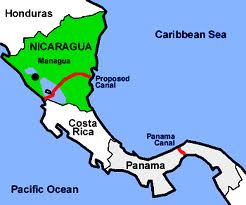Protesting China’s Canal
Thousands of Nicaraguans have begun protesting against the so-called Great Interoceanic Canal, a project funded by Hong Kong Business man Wang Jing meant to connect the Caribbean Sea and the Pacific Ocean.
Since the 1800s Nicaraguans have dreamed of creating a canal to facilitate trade. In June of last year, after 72 failed attempts at building a canal, the Nicaraguan parliament controlled by President Ortega and his Sandinista National Liberation Front party approved the new construction attempt by Wang Jing, a Chinese telecommunications mogul. The government granted him a 100-year concession controlling a large area of land in Nicaragua. The proposed canal will cost $50 billion and will be longer, deeper, and wider than the Panama canal.
mogul. The government granted him a 100-year concession controlling a large area of land in Nicaragua. The proposed canal will cost $50 billion and will be longer, deeper, and wider than the Panama canal.
The government in Nicaragua alleges that the canal will provide benefits to the citizens of the country. These benefits include employment for 50,000 people during the construction-period and 200,000 more once the canal is open and running. With 42.5% of the population below the poverty line and 46.5% of the population underemployed, such increases in employment could greatly benefit the Nicaraguan economy. The canal is estimated to generate growth rates as high as 14 percent a year.
Average citizens and opposition politicians are unconvinced of the benefits that the canal would provide in Nicaragua. They are also angered by the non-democratic process by which the canal was approved. While the canal will employ 50,000 people, most of them will actually not be Nicaraguan, creating what the local press has described as a “Chinese Invasion.” The surge of Chinese workers has exacerbated food shortages in Nicaragua, a country whose food supply is already precarious enough to rely on the World Food Programme. Further, Nicaraguans fear losing the properties that have owned for decades to foreign investors. One farmer participating in a protest in Potosi said, “We do not want the canal to be built. Nobody should come in here and take over our land.” Moreover, there are great concerns about how the proposed project may affect the environment. The initial digging of the canal diminish water quality in wetlands surrounding canal constructions near Lake Nicaragua. The lake is especially important to the country since it’s a major source of drinking water and irrigation. Nearly 1 million acres of tropical forest and wetlands could be destroyed by the project, jeopardizing ecosystems, fishing and wildlife habitats. There is also a possibility that the construction would disturb active volcanoes.
Though Wang Jing claims that the endeavor is purely commercial, there is speculation from academics such as R Evan Ellis, professor at the National Defense University, that Jing is backed by the Chinese government. The Chinese government would have great political incentive to sponsor a canal in Nicaragua. Nicaragua is one of few countries that maintains diplomatic relations with Taiwan. China and Taiwan have an adversarial relationship characterized by limited contact, tensions, and instability. China may attempt to influence Nicaragua with its economic advantages in order to get Nicaragua to cease its relations with Taiwan. Furthermore, China’s investment in Nicaragua reflects China’s attempt to expand its influence in the US’ area of influence and to counterbalance American influence in Latin America. Additionally the Chinese government would have great economic benefit from the canal. It would provide commercial leverage over Latin American governments and companies, which could allow China to guarantee trade routes and access to raw materials.
Panama is likely to oppose the construction of a Nicaraguan canal since it would compete with their Panama Canal which earns annual revenues of $2 billion dollars. If Nicaragua builds a canal, it would take a great deal of traffic from Panama forcing Panama to lower rates and thus earn less. With Chinese backing, some suggest that the Nicaraguan Canal will provide an alternative to the Panama canal, often seen as a proxy for the US, for those with antagonistic relationships with the US such as Venezuela.
With strong sentiments both in favor and against the construction of a Nicaraguan Canal, it is uncertain which faction will win the debate and whether the canal will in fact be built. If the canal is built, it will reshape Latin America physically and geopolitically.
